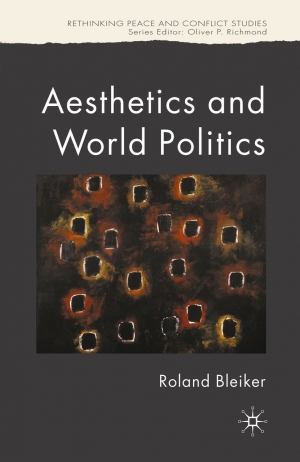International Studies
When Sheila Fitzpatrick arrived in Oxford in 1964, with a couple of years of Russian language studies at Melbourne University and a Commonwealth Scholarship under her belt, she had more than a passing knowledge of Cold War spying. Her father, Brian Fitzpatrick, was a labour historian and well-known leftist who had advised the Labor Opposition leader H.V. Evatt ...
Nick Bisley reviews 'The China Choice: Why America Should Share Power' by Hugh White
Figures released by the International Monetary Fund on 16 August 2010 revealed that China had overtaken Japan to become the world’s second-largest economy. Within a generation it had gone from being an isolated society that could barely feed its own people to the largest producer of steel and concrete on the planet, a vital link in global production chains and, since 2008, the most important engine for global economic growth.
... (read more)N.A.J. Taylor reviews 'The Problem of Harm in World Politics: Theoretical Investigations' by Andrew Linklater
Violent and non-violent harm is endured, inflicted, and internalised by all people at different times, and to varying degrees. It was Cicero who is believed to have first posited that the main obligation human beings have is to refrain from harming one another, and that any unnecessary act of doing so renders that person an enemy of the human race.
... (read more)Geoff Winestock reviews 'The Strongman: Vladimir Putin and the struggle for Russia' by Angus Roxburgh
The Western stereotype of the Russian bear has been reborn over the past decade, and Vladimir Putin can take much of the credit. If Hollywood decides to make a movie of John Le Carré’s Smiley’s People, the Russian president, a German-speaking KGB officer, would make an excellent Carla, the master spy.
... (read more)Alison Broinowski reviews 'Power Shift: Australia’s Future between Washington and Beijing' (Quarterly Essay 39) by Hugh White
Not for forty years have Australians had real arguments with their governments about international relations. Many marched in 2003 against the Iraq invasion, but were ignored. Now, if the national obesity rate is any guide, Australians spend more time eating, partying and sleeping than having the earnest pre-breakfast discussions about foreign relations that Fukuzawa recommended.
... (read more)Peter Rodgers reviews 'Palestine Betrayed' by Efraim Karsh and 'Gaza: Morality, law & politics' edited by Raimond Gaita
It is a great pity that Efraim Karsh could not have read Raimond Gaita’s new collection of essays before completing his own. The essays might have prompted him to reflect that the Israeli–Palestinian conflict is not nearly as straightforward as he would have us believe.
... (read more)Manfred B. Steger reviews 'Aesthetics and World Politics' by Roland Bleiker
Ever since Plato famously proposed to banish poets and their ‘embellished tales’ from his ideal Republic, the relationship between art and politics has been strained. On the negative end of the spectrum hovers the warning example of a failed Austrian landscape painter who proceeded to push the world into total war. What makes things even worse is that the remarkable appeal of Hitler’s ghastly vision in 1930s Germany owed much to the efforts of sympathetic artists such as Leni Riefenstahl or Gottfried Benn. But even more inspiring figures on the positive end of the spectrum – Václav Havel and Melina Mercouri come to mind here – usually fall from popular grace once they accept political office.
... (read more)Barack Obama has promised to change the way America does things. If he is serious about this when it comes to the Israeli–Palestinian conflict, we can only hope that he will read Neve Gordon’s examination of Israel’s post-1967 rule of the Gaza Strip and the West Bank. The subject matter, and the occasionally choking academic writing, do not make for a pretty story. But the book might serve to temper the new president’s apparently effusive support for Israel. That country’s occupation of the Palestinian territories, and its determined settlement-building programme, are an ongoing disaster for Israelis and Palestinians alike.
... (read more)Joan Grant reviews 'Undiplomatic Activities' by Richard Woolcott, illustrated by David Rowe
Are ambassadors anachronistic these days, or do top-secret cables and personal finesse still outflank headlines and blogs? In his new book, Richard Woolcott, one of Australia’s most experienced former diplomats, quotes a French colleague who believes that ‘we have become a combination of travel agent, messenger boy, and inn keeper’. Yet Woolcott’s autobiography, The Hot Seat (2003), exemplifies historian Charles Webster’s definition of diplomacy: ‘… obtaining the maximum national interest with a minimum of friction and resentment’ – a rather more significant role. Perhaps this is because Ambassador Woolcott’s career spanned most of the second half of the twentieth century (he retired in 1992), when individuals found it easier to make an impact on what he calls ‘probably the world’s second oldest profession’.
... (read more)In recent years, particularly since the Tampa and children overboard incidents and the 9/11 attacks, there has been a marked change in public and political perceptions of Middle Eastern migrants and the Arab–Australian community. In August 2001, for instance, the chair of a parliamentary inquiry into Australia’s relations with the Middle East, David Jull, introduced the committee’s report with the ‘reassuring’ observation that ‘for the most part, the tensions and conflict in the Middle East have not affected the relations between the various community groups in Australia’.
... (read more)









